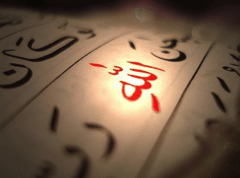What Do Classical Scholars Say About Jalal al-Din al-Rumi?
Answered by Ustadh Salman Younas
Question: Could you please explain the stance of classical ahly sunnah scholars on mawlana jalaluddin rumi? Have scholars like Ibn Hajar al-Asqalani or Dhahabi said something about him?
Answer: assalamu `alaykum
Mawlana Jalal al-Din al-Rumi (d. 672 h.) was a recognized scholar of the Hanafi school, as were his father, son, and grandson, all being jurists of the highest caliber, as well as an Imam of the science of self-purification (ihsan).
In his compendium of Hanafi scholars, Abu’l Wafa’ al-Qurshi (d. 696 h.) introduces him as someone “knowledgeable of the [Hanafi] school, possessing vast understanding of juridical matters, thoroughly knowledgeable of juridical differences and other types of sciences.” [Jawahir al-Mudiyya]
Similarly, Ibn Qutlubugha (d. 879 h.), the great Hanafi jurist, stated in his Taj al-Tarajim after mentioning Mawlana Rumi’s lineage back to our liege=lord Abu Bakr (Allah be well pleased with him) that “he was knowledgeable of the legal schools, differences of opinion, and various types of sciences… and he composed many lines of poetry.”
On account of his mastery of the Islamic sciences, he was given the duty of teaching after the death of his father in the city of Konya (in modern day Turkey). He continued the task of instructing students in the outward sciences until his meeting with Shams al-Tabriz.
Perhaps more noteworthy than all of the above are the biographical notices on his son, Baha’ al-Din Ahmad, who was described in Ibn Hajar `Asqalani’s Durar al-Kamina as, “one of the Imams of the Hanafi Masters, brilliant, ascetic, pious, a jurist, scholar of legal methodology (usul), and grammarian…” and by al-Qurshi in his Jawahir as an “Imam… who followed his father in leaving the world behind.”
The reason why these notices on his son are significant is because he was one of the standard-bearers of his father, both in the outward and inward sciences. This is so much so that the foundations of the Mevlevi order are often stated to have been laid by Baha’ al-Din Ahmad and he, like his father, composed an array of Persian poetry.
All of this goes to show that Mawlana Jalal al-Din was nothing but an orthodox Sunni scholar who not only mastered the outward sciences but actualized the inward as well. May Allah be well-pleaed with him and those who followed him.
Salman
Checked & Approved by Faraz Rabbani
Related Answers:
Mawlana Rumi: “A Hundred Regrets for Lost Opportunities”
